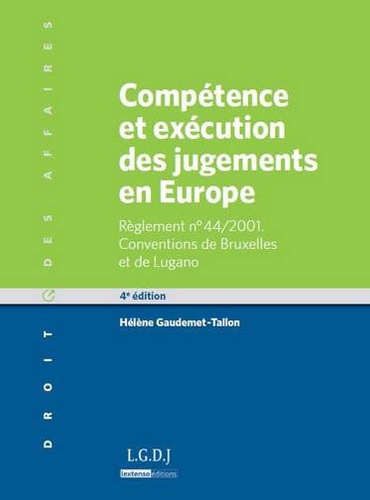 The Commission has just published its Action Plan implementing the Stockholm Programme. It contains a timetable of the Commission’s actions until 2014. Here are those regarding conflict issues (if I did not miss any):
The Commission has just published its Action Plan implementing the Stockholm Programme. It contains a timetable of the Commission’s actions until 2014. Here are those regarding conflict issues (if I did not miss any):
Legislative Proposals
2010
– Legislative Proposal for the revision of Regulation (EC) No 44/2001 on jurisdiction, recognition and enforcement of judgments in civil and commercial matters (Brussels I)
– Proposal for a Regulation on the conflicts of laws in matters concerning matrimonial property rights, including the question of jurisdiction and mutual recognition, and for Regulation on the property consequences of the separation of couples from other types of unions
– Proposal for a Regulation on improving the efficiency of the enforcement of judgements in the European Union: the attachment of bank accounts
2011
– Proposal for a Regulation amending Regulation (EC) No 2201/2003 concerning jurisdiction and the recognition and enforcement of judgments in matrimonial matters and the matters of parental responsibility, including establishment of common minimum standards in relation to the recognition of decisions on parental responsibility, following a report on its application (2011-2013)
– Regulation on limitation periods on cross border road traffic accidents
2012
– Proposal for Regulation amending Regulation (EC) No 1346/2000 on insolvency proceedings, following a report on its application (2012-2013)
2013
– Legislative proposal on mutual recognition of the effects of certain civil status documents (e.g. relating to birth, affiliation, adoption, name)
– Proposal for a Regulation on improving the efficiency of the enforcement of judgements in the European Union: transparency of debtor’s assets
– Legislative proposal for dispensing with the formalities for the legalisation of documents between the Member States
2014
– Legislative proposal aimed at improving the consistency of existing Union legislation in the field of civil procedural law
Green Papers and Reports
2010
– Green paper on the free circulation of the documents: civil status documents, authentic acts and the simplification of legalisation
– Report on the assignment of claims under Regulation (EC) No 593/2008 on the law applicable to contractual relations (Rome I)
2011
– Report on application of Regulation (EC) No 1393/2007 on service of documents in civil and commercial matters, if necessary followed by a proposal for revision which could include the establishment of common minimum standards (2011-2012)
– Report on the application of Regulation (EC) No 805/2008 on the European Enforcement Order for uncontested claims
2012
– Report on application of Regulation (EC) No 1206/2001 on the taking of evidence in civil and commercial matters, if necessary followed by a proposal for revision which could include the establishment of common minimum standards (2012-2013)
– Report on the application of Regulation (EC) No 804/2007 on the applicable law on noncontractual obligations (Rome II)
– Report on the functioning of the present EU regime on civil procedural law across borders
2013
– Report on application of Regulation (EC) No 861/2007 establishing a European Small Claims Procedure
– Report on application of Regulation (EC) No 1896/2006 creating a European order for payment procedure
– Report on the applicable law on insurance contracts under Regulation (EC) No 593/2008 on the law applicable to contractual relations (Rome I)
– Green paper on the minimum standards for civil procedures and necessary follow up
2014
– Report on the application of the 2000 Hague Convention on the International Protection of Adults, assessing also the need for additional proposals as regards vulnerable adults
– Green paper on private international law aspects, including applicable law, relating to companies, associations and other legal persons
The Action Plan also provides for other acts such as Practice Guides, Fact Sheets and Compendia, some of which deal with conflict issues.
 The Commission has just published its
The Commission has just published its  The much awaited fourth edition of
The much awaited fourth edition of  On May 20-21, 2010, the Academy of European Law will host a conference on
On May 20-21, 2010, the Academy of European Law will host a conference on